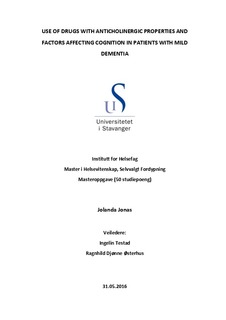Use of drugs with anticholinergic properties and factors affecting cognition in patients with mild dementia
Master thesis
Permanent lenke
http://hdl.handle.net/11250/2409448Utgivelsesdato
2016-05Metadata
Vis full innførselSamlinger
Sammendrag
Background: Elderly people, particularly those with dementia, are at high risk of adverse anticholinergic drug effects. Despite the well-recognized potential for cognitive decline with anticholinergic agents, their use continues even among patients with dementia. Objectives: to estimate the prevalence of drugs with anticholinergic drug effects and its impact on cognitive decline over time in home-dwelling people with dementia in Norway. Methods: Referrals to five outpatient clinics in geriatric medicine, old age psychiatry and neurology in Western Norway during 2005-2013 were included. Cognitive decline was assessed for up to 5 years using Clinical Dementia Rating (CDR) and Mini-Mental State Examination (MMSE). Cox regression was applied to model the cognitive decline. Results: Nearly 60% patients received at least one drug with anticholinergic property whereas almost 12% were taking drugs with well-known anticholinergic activity. However, the findings did not support the hypothesis that use of drugs with anticholinergic properties increases the risk of worsening cognitive decline among home-dwelling people with dementia. Moreover, the study showed that patients with Lewy body dementia and lower cognition at baseline predicted faster cognitive decline.
The thesis is part of the Master Study in Health Sciences at University of Stavanger, Norway. The thesis is divided into two parts; the first part is supported by theoretical framework, and the second part is an article, which is to be sent for publication.
Beskrivelse
Master's thesis in Health and social sciences
